September 9, 2015 •
Wednesday Government Relations News
Campaign Finance California: “‘Power Search’ Offers New Tool to Follow California Campaign Money” by Jim Miller for Sacramento Bee Florida: “Miami Beach Commissioner Closing Controversial Relentless for Progress PAC” by Joey Flechas for Miami Herald Iowa: “Iowa’s Medicaid Management: A […]
 Campaign Finance
Campaign Finance
California: “‘Power Search’ Offers New Tool to Follow California Campaign Money” by Jim Miller for Sacramento Bee
Florida: “Miami Beach Commissioner Closing Controversial Relentless for Progress PAC” by Joey Flechas for Miami Herald
Iowa: “Iowa’s Medicaid Management: A game of pay to play?” by Jason Clayworth for Des Moines Register
Maine: “Maine Voters Hope To Restore Their Revolutionary Election System” by Paul Blumenthal for Huffington Post
Montana: “Rules Aimed at Cracking down on Campaign ‘Dark Money’ Come in for Criticism” by Mike Dennison for KPAX
Ethics
“Sanders to Introduce Bill Targeting High Drug Prices” by Peter Sullivan for The Hill
“Report Finds ‘Reason to Believe’ Rep. Honda’s Campaign Blurred Ethics Lines” by Noah Bierman for Los Angeles Times
Elections
California: “California Is Trying Everything to Get More People to Vote” by Alice Ollstein for ThinkProgress
September 4, 2015 •
Enjoy Your Labor Day!
The office of State and Federal Communications, Inc. will be closed on Monday, September 7, in honor of Labor Day. Have a wonderful weekend!
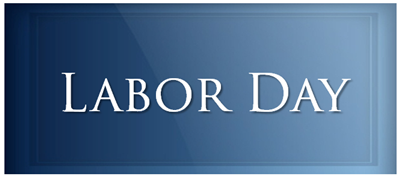 The office of State and Federal Communications, Inc. will be closed on Monday, September 7, in honor of Labor Day.
The office of State and Federal Communications, Inc. will be closed on Monday, September 7, in honor of Labor Day.
Have a wonderful weekend!
September 4, 2015 •
Alabama Governor Calls Special Legislative Session
Gov. Robert Bentley has called a special legislative session to begin September 8, 2015. The session has been called to address the $200 million general fund budget shortfall. The governor has proposed three measures to reform the budget, including transferring […]
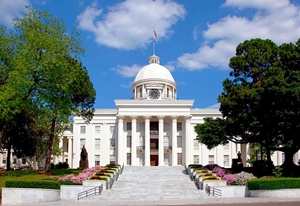 Gov. Robert Bentley has called a special legislative session to begin September 8, 2015.
Gov. Robert Bentley has called a special legislative session to begin September 8, 2015.
The session has been called to address the $200 million general fund budget shortfall.
The governor has proposed three measures to reform the budget, including transferring money from the educational trust fund to the general fund and removing earmarks currently placed on certain state taxes. He has also proposed increasing the cigarette tax and amending the business privilege tax.
September 4, 2015 •
News You Can Use Digest – September 4, 2015
Federal: Lobbying Firm Fined for Disclosure Violations Center for Public Integrity – Dave Levinthal | Published: 8/28/2015 The Carmen Group will pay a $125,000 fine to settle allegations that it repeatedly violated the Lobbying Disclosure Act by failing to disclose some […]

Federal:
Lobbying Firm Fined for Disclosure Violations
Center for Public Integrity – Dave Levinthal | Published: 8/28/2015
The Carmen Group will pay a $125,000 fine to settle allegations that it repeatedly violated the Lobbying Disclosure Act by failing to disclose some of its lobbying activities and political contributions. The Center for Public Integrity had cited vague disclosure by the Carmen Group of its work securing $45 million in Hurricane Katrina relief loan forgiveness for client Xavier University of Louisiana as a leading example of toothless federal lobbying laws in need of reform. The settlement did not specifically mention the Xavier case. Both the House and Senate referred the firm to prosecutors for failing to file some quarterly reports, and individual lobbyists registered to work on behalf of its clients were accused of failing to file semi-annual reports of campaign donations.
From the States and Municipalities:
California – FBI Raids Palm Springs City Hall in Corruption Probe
USA Today – Jesse Marx and Kia Farhang (Palm Springs Desert Sun) | Published: 9/1/2015
The FBI and local agents raided Palm Springs City Hall and went to the mayor’s home as part of a corruption probe. The Palm Springs Desert Sun has published articles detailing the more than $200,000 in consulting work that Mayor Steve Pougnet did for a company owned by a developer, Richard Meaney, at a time when the firm’s business license had been suspended. Pougnet voted to sell city-owned land to Meaney and his partner for under $200,000, not long after purchasing an adjacent lot from a private owner for $1 million. The city council later voted to rescind the deal, and the California Fair Political Practices Commission is investigating Pougnet’s vote.
California – ‘Power Search’ Offers New Tool to Follow California Campaign Money
Sacramento Bee – Jim Miller | Published: 9/2/2015
Californians will have an easier time determining who is giving money to candidates and causes when a new tool becomes available on the secretary of state’s website. The antiquated CalAccess system, which shows political donations and lobbying information on the site, is clunky and difficult to use, especially for searching and sorting the data. A new search engine has been added to help users see more fully and easily, for example, the money received by candidates and ballot-measure campaigns. It will also be easier to see where industries and other special interests are concentrating their money.
California – San Jose City Clerk Given Second Chance Following Closed-Session Review
San Jose Mercury News – Ramona Giwargis | Published: 9/1/2015
The San Jose City Council decided to give City Clerk Toni Taber a second chance after a closed-session review of her job performance. Tabor had faced dismissal after her office told council members and candidates to follow the state law on reporting late campaign contributions, even though it was contrary to the city’s election law. The misinformation led to hundreds of violations for Mayor Sam Liccardo and the majority of council members, resulting in thousands of dollars of political donations being improperly reported in the past two years.
Colorado – Denver Ethics Board Floats Reforms Aimed at Boosting Public Confidence
Denver Post – Jon Murray | Published: 8/27/2015
The Denver Board of Ethics is considering a series of reforms. The changes would set a maximum annual value of $250 per donor or business for gifts of meals and event tickets to an official or employee who is in a position to take direct official action that benefits the donor. Currently, the limit is four meals or tickets, without a maximum dollar value. The proposals also would expand the definition of family members who cannot benefit from contracts or official action that are directed by an official or employee.
Illinois – Chicago Sues Red Light Camera Firm for $300 Million
Chicago Tribune – David Kidwell | Published: 8/31/2015
Chicago has brought a $300 million lawsuit against Redlex Traffic Systems based on the company’s bribery scandal involving the city’s red-light camera contract. Specifically, the city has joined a whistleblower lawsuit filed against Reflex last year by the company’s former executive vice president who was allegedly involved with the scandal. The suit alleges that John Bills, a now-retired city official who was previously responsible for managing Chicago’s red-light camera system, steered $124 million in city contracts to Redflex in exchange for cash and other personal benefits. The suit notes Redflex officials had stated the firm was following the law and the city’s ethics rules while operating the cameras.
Iowa – Iowa’s Medicaid Management: A game of pay to play?
Des Moines Register – Jason Clayworth | Published: 8/30/2015
Lobbyists and PACs representing the four companies whose proposals were selected to manage Iowa’s Medicaid program donated nearly $68,000 to the campaigns of state officials since 2010. At least another $57,000 flowed in from companies that submitted bids but failed to win the contracts. The Iowa amounts pale in comparison to $4.6 million that the four winning companies and their PACs have contributed to other governors, legislative leaders, and PACs across the country over the past five years. Critics contend such donations are part of widespread private sector efforts to shape public policy.
Maryland – Maryland Receives ‘B’ Grade on Lobbying Disclosure
Carroll County Times – Wiley Hayes | Published: 8/31/2015
The Sunlight Foundation analyzed lobbyist disclosure laws for all the states and gave Maryland a grade of “B.” Only seven states received higher scores. “Maryland is doing reasonably well in a number of categories,” said Emily Shaw, the deputy policy director for the foundation. “One of the things it does … is requiring lobbyists to provide very detailed lists of expenditures. They also do well at document accessibility. They allow people to see the documents that lobbyists fill out and how much lobbyist are paid for their work.”
Missouri – Ethics Commission Rules Dinner Violated Law, Issues No Fines
Columbia Tribune – Rudi Keller | Published: 8/31/2015
The Missouri Ethics Commission found seven lobbyists likely broke state laws requiring them to name lawmakers they buy meals for. The lobbyists were among 15 who split a nearly $5,700 dinner bill for about 40 people, including five Missouri lawmakers, during last year’s American Legislative Exchange Council meeting. The commission says the Missouri lobbyists improperly reported the meal as being bought for the General Assembly but not all lawmakers were invited. The ethics panel said the lobbyists believed all legislators had been invited and later corrected their reports to list the expenses as going toward individual lawmakers.
New Mexico – Complaint: A story of casinos, campaign money and crime
Santa Fe New Mexican – Milan Simonich, Steve Terrell, and Staci Matlock | Published: 8/29/2015
New Mexico’s attorney general filed a 64-count criminal case against Secretary of State Dianna Duran, accusing her of embezzlement, money-laundering, campaign finance violations, and other offenses. The complaint said Duran misused campaign contributions for personal expenses, adding that the investigation was sparked by a tip that she deposited large amounts of money into her personal bank account that did not line up with her known income streams. The complaint said funds were then transferred between her personal and campaign-affiliated accounts, culminating in “large debits for cash expenditures occurring at casinos throughout the state of New Mexico.”
North Carolina – Influence of Lobbyists Makes Them Practically a ‘Third House’ of Legislature
WRAL – Mark Binker | Published: 8/19/2015
Although their roles are not described in many civics textbooks, and many would rather stay out of the news altogether, very little public policy makes it through the North Carolina Legislature without input from lobbyists. Two decades ago, public policy professor Alan Rosenthal described lobbyists who plied their trade around the nation’s state House and Senate chambers as the “third house” of any particular lawmaking body. Rosenthal’s observation that “legislators, like the rest of us, are more apt to do things for individuals they like and trust,” is at once an observation about human nature, a truism of the profession, and at the root of public suspicions about lobbyists.
Oregon – Lobbying Spending Is Up. Where does the money go?
Salem Statesman Journal – Gordon Freidman | Published: 8/31/2015
Lobbyist spending has increased by more than 94 percent since 2010. “Everybody has representation in Salem for almost any conceivable interest or business,” said Paul Cosgrove, head of government relations at Lindsay Hart, a Portland law firm. Gary Conkling, a lobbyist and co-founder of CFM Communications, said as time has gone on and there are more lobbyists, one thing has been central to his work: integrity. “I can tell you when I first started, things were a little more slippery than they are today,” Conkling said.
Pennsylvania – Ex-Liquor Board Official Was Living Top-Shelf Life
Philadelphia Inquirer; Associated Press – | Published: 8/31/2015
James Short, a former top Pennsylvania Liquor Control Board (LCB) executive, will plead guilty to federal charges that he solicited and concealed kickbacks from vendors doing business with the agency overseeing the state’s 500 liquor stores. The federal probe that began last year revealed a culture in which Short and other LCB officials were entertained and handed trips and gifts from vendors seeking to do business with the state agency, one of the world’s largest buyers of alcohol.
Wisconsin – Elections Board Sends Questions about Lobbyists’ Presidential Contributions to Legislature
Minneapolis Star Tribune – Todd Richmond (Associated Press) | Published: 9/1/2015
The Wisconsin Government Accountability Board voted to ask state lawmakers to decide if and when lobbyists should be permitted to donate to Gov. Scott Walker’s presidential campaign. “When the law is silent on an issue and there is nothing to interpret, it is up to the Legislature to decide,” said board spokesperson Reid Magney. Wisconsin law allows lobbyists to give to state candidates between the day they circulate nomination papers and Election Day. But major party presidential candidates do not have to file nomination papers, creating confusion about whether lobbyists can give to them at all and over what period of time.
Wisconsin – GAB Head Told Former Employee to Tone down Comments
Milwaukee Journal Sentinel – Patrick Marley | Published: 9/1/2015
Wisconsin Government Accountability (GAB) Board Director Kevin Kennedy said his agency’s employees have personal political views but they do not make any decisions, as he tries to stave off Republican lawmakers’ plans to restructure the board. Conservatives’ calls to overhaul the GAB have grown louder following a newspaper story detailing a former staff attorney’s emails. The messages offered encouragement to an investigator looking into whether Gov. Scott Walker’s recall campaign illegally coordinated with outside conservative groups.
 State and Federal Communications produces a weekly summary of national news, offering more than 60 articles per week focused on ethics, lobbying, and campaign finance.
State and Federal Communications produces a weekly summary of national news, offering more than 60 articles per week focused on ethics, lobbying, and campaign finance.
September 3, 2015 •
New Jurisdiction Added to Our Website!
The number of municipalities and regional governments our research associates track continues to grow. We now cover almost 300 municipalities and local governments. This is part of a continuous effort to better serve the needs of our clients. In that […]
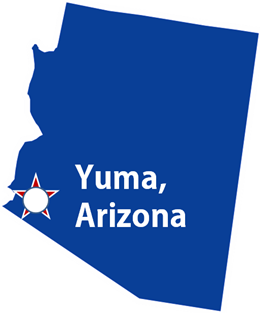 The number of municipalities and regional governments our research associates track continues to grow. We now cover almost 300 municipalities and local governments. This is part of a continuous effort to better serve the needs of our clients.
The number of municipalities and regional governments our research associates track continues to grow. We now cover almost 300 municipalities and local governments. This is part of a continuous effort to better serve the needs of our clients.
In that effort, we have recently added abridged jurisdictions to our website. These entries, condensed due to the limited number of relevant local laws, provide the core information our clients need for their government relations work.
The new jurisdiction is: Yuma, Arizona.
September 3, 2015 •
San Jose, CA Clerk Keeps Job, But Faces Review of Her Office
City Clerk Toni Taber was given a reprieve by City Council following a review of the clerk’s job performance during a closed-door meeting on September 1. She had been facing dismissal. The review was triggered by faulty advice provided by […]
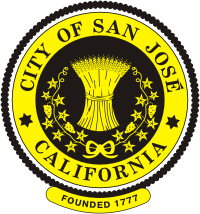 City Clerk Toni Taber was given a reprieve by City Council following a review of the clerk’s job performance during a closed-door meeting on September 1. She had been facing dismissal.
City Clerk Toni Taber was given a reprieve by City Council following a review of the clerk’s job performance during a closed-door meeting on September 1. She had been facing dismissal.
The review was triggered by faulty advice provided by the clerk’s office to City Council and mayoral candidates during the 2014 local elections. The clerk’s office had instructed the candidates to follow state law when reporting late contributions. However, local law has stricter reporting standards.
This lack of information resulted in thousands of dollars in campaign contributions being improperly reported over the past two years and one councilman being fined $10,000 for improper filing.
While Taber was granted a second chance, her office still faces an audit and may have several of its key functions transferred to other city departments.
September 3, 2015 •
MSRB Seeks Approval from SEC for Gift Rule Amendments
On September 2, the Municipal Securities Rulemaking Board (MSRB) requested approval from the Securities and Exchange Commission (SEC) for amendments to MSRB Rule G-20, a conflict-of-interest rule concerning gifts and gratuities. The proposed amendments include limiting gifts to $100 for […]
 On September 2, the Municipal Securities Rulemaking Board (MSRB) requested approval from the Securities and Exchange Commission (SEC) for amendments to MSRB Rule G-20, a conflict-of-interest rule concerning gifts and gratuities. The proposed amendments include limiting gifts to $100 for municipal advisors giving gifts to employees of entities engaged in municipal securities activities. The new rules for municipal advisors also would prohibit receiving reimbursement of entertainment expenses from the proceeds of an offering of municipal securities.
On September 2, the Municipal Securities Rulemaking Board (MSRB) requested approval from the Securities and Exchange Commission (SEC) for amendments to MSRB Rule G-20, a conflict-of-interest rule concerning gifts and gratuities. The proposed amendments include limiting gifts to $100 for municipal advisors giving gifts to employees of entities engaged in municipal securities activities. The new rules for municipal advisors also would prohibit receiving reimbursement of entertainment expenses from the proceeds of an offering of municipal securities.
“Amending the MSRB’s existing gifts rule would ensure common standards for dealers and municipal advisors that all operate in the municipal securities market,” said MSRB Executive Director Lynnette Kelly in a press release.
September 3, 2015 •
Austin, TX Lobby Law Changes in the Works
On September 23, Austin, Texas City Council Member Leslie Pool intends to present a new lobbying ordinance to the Audit and Finance Committee. On Monday, the Ethics Review Commission was asked by Pool to set up a public hearing before […]
 On September 23, Austin, Texas City Council Member Leslie Pool intends to present a new lobbying ordinance to the Audit and Finance Committee.
On September 23, Austin, Texas City Council Member Leslie Pool intends to present a new lobbying ordinance to the Audit and Finance Committee.
On Monday, the Ethics Review Commission was asked by Pool to set up a public hearing before the September 23 date. “Council members can start raising money in May [2016], so that’s why we’re trying to keep this moving forward,” Pool said, according to the Austin Monitor.
Commission Chair Austin Kaplan told the Austin Monitor the ordinance would subsequently be addressed by the full Ethics Review Commission at its September 28 meeting. Proposed changes to the city’s lobbying law include increasing the registration fee from $300 to $350 a year for those earning at least $2,000 per quarter and eliminating the exception to register when an individual claims communications are incidental to other employment not for the purpose of lobbying.
Photo of Austin, Texas skyline by Erik A. Ellison on Wikimedia Commons.
September 3, 2015 •
Thursday News Roundup
Lobbying Oregon: “Portland Auditor Says Steve Novick, Charlie Hales Violated Lobbying Rule on Uber Meeting” by Andrew Theen for Portland Oregonian Texas: “Ethics Commission Begins to Examine Proposed Lobbying Changes” by Jack Craver for Austin Monitor Campaign Finance California: “San […]
 Lobbying
Lobbying
Oregon: “Portland Auditor Says Steve Novick, Charlie Hales Violated Lobbying Rule on Uber Meeting” by Andrew Theen for Portland Oregonian
Texas: “Ethics Commission Begins to Examine Proposed Lobbying Changes” by Jack Craver for Austin Monitor
Campaign Finance
California: “San Jose City Clerk Given Second Chance Following Closed-Session Review” by Ramona Giwargis for San Jose Mercury News
New Mexico: “New Push for Campaign Finance Reforms” by Dan Boyd for Albuquerque Journal
Wisconsin: “Elections Board Sends Questions about Lobbyists’ Presidential Contributions to Legislature” by Todd Richmond (Associated Press) for Minneapolis Star Tribune
Ethics
“FBI Raids Palm Springs City Hall in Corruption Probe” by Jesse Marx and Kia Farhang (Palm Springs Desert Sun) for USA Today
Wisconsin: “GAB Head Told Former Employee to Tone down Comments” by Patrick Marley for Milwaukee Journal Sentinel
Elections
“How Social Media Is Ruining Politics” by Nicholas Carr for Politico
September 2, 2015 •
Missouri Lobbyists Must Amend Expenditure Reporting for State Night Dinner
The Missouri Ethics Commission recently found a group of lobbyists improperly reported food and drink expenditures made during a 2014 American Legislative Exchange Council State Night dinner. The lobbyists reported the entire General Assembly as the recipient for the total […]
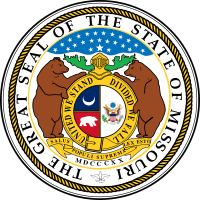 The Missouri Ethics Commission recently found a group of lobbyists improperly reported food and drink expenditures made during a 2014 American Legislative Exchange Council State Night dinner. The lobbyists reported the entire General Assembly as the recipient for the total cost of the dinner, though not every member of the Legislature received an invitation to the event.
The Missouri Ethics Commission recently found a group of lobbyists improperly reported food and drink expenditures made during a 2014 American Legislative Exchange Council State Night dinner. The lobbyists reported the entire General Assembly as the recipient for the total cost of the dinner, though not every member of the Legislature received an invitation to the event.
Such expenditures were required to be reported on behalf of each public official rather than as a group expenditure. The punishment simply requires each lobbyist to amend his or her filing and cite the specific legislators in attendance at the dinner.
Some feel the ruling sets a dangerous precedent, as lobbyists may continue to hide individual gifts under the guise of a group event as long as the entire group receives an invitation.
September 2, 2015 •
Wednesday Government Relations News
Lobbying “Hillary Clinton Sides with Liberals on Anti-Lobbying Bill” by Sam Frizell for Time Missouri: “Ethics Commission Rules Dinner Violated Law, Issues No Fines” by Rudi Keller for Columbia Tribune Missouri: “Missouri Lawmakers Ranked by How Many Lobbyist Gifts They […]
 Lobbying
Lobbying
“Hillary Clinton Sides with Liberals on Anti-Lobbying Bill” by Sam Frizell for Time
Missouri: “Ethics Commission Rules Dinner Violated Law, Issues No Fines” by Rudi Keller for Columbia Tribune
Missouri: “Missouri Lawmakers Ranked by How Many Lobbyist Gifts They Received” by Jason Hancock for Kansas City Star
Campaign Finance
South Carolina: “Bobby Harrell Ordered to Pay $113,475 Used for Legal Fees” by Andrew Shain for The State
Ethics
Illinois: “Chicago Sues Red Light Camera Firm for $300 Million” by David Kidwell for Chicago Tribune
Michigan: “House Report Accuses Michigan Reps. Courser, Gamrat of ‘Deceptive, Deceitful’ Misconduct” by Jonathan Oosting for Mlive.com
Pennsylvania: “Ex-Liquor Board Official Was Living Top-Shelf Life” by The Associated Press for Philadelphia Inquirer
Virginia: “McDonnell Can Remain Free While Supreme Court Decides on Review” by Robert Barnes and Matt Zapotosky for Washington Post
Elections
“Donald Trump and the Decline of the White Voter” by Janelle Ross for Washington Post
September 1, 2015 •
Our September Photo Scrapbook
Enjoy these fun photos from the 2015 NCSL Legislative Forum in Seattle, Washington!
Enjoy these fun photos from the 2015 NCSL Legislative Forum in Seattle, Washington!
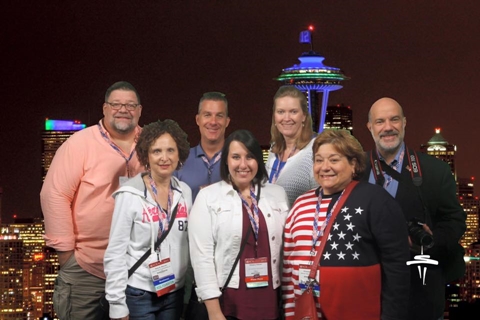
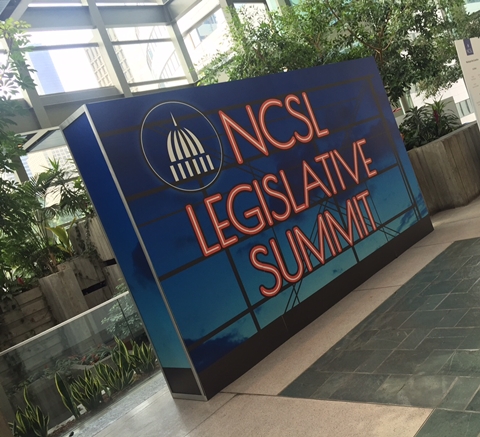


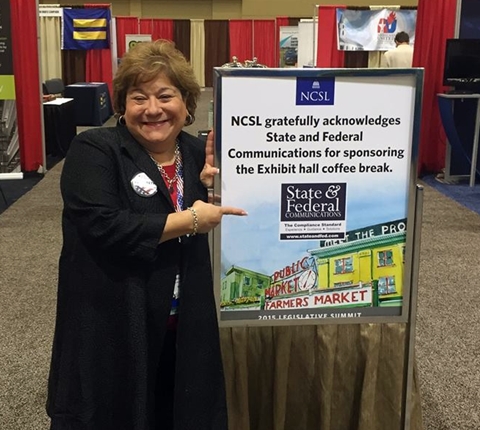
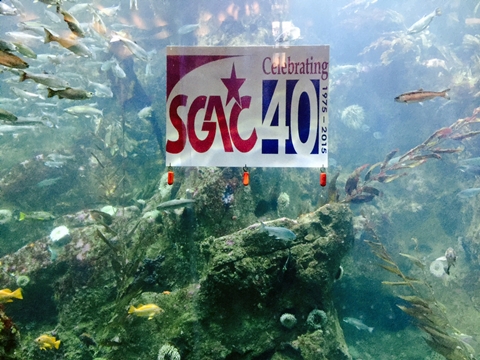
September 1, 2015 •
Ask the Experts – Political Contributions from State Vendor Employees
Q. I would like to contribute to political candidates in my state, but my company is a state vendor. Are there laws prohibiting me from making personal contributions? A. Whether an employee of a state vendor may contribute to political […]
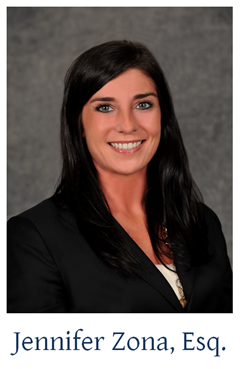 Q. I would like to contribute to political candidates in my state, but my company is a state vendor. Are there laws prohibiting me from making personal contributions?
Q. I would like to contribute to political candidates in my state, but my company is a state vendor. Are there laws prohibiting me from making personal contributions?
A. Whether an employee of a state vendor may contribute to political candidates varies widely based on jurisdiction. The answer may depend on the employee’s role in his or her company, as well as the position held by the candidate receiving the contribution.
Ohio, for example, prohibits a partner, shareholder, administrator, executor, or trustee of a state vendor from making personal contributions exceeding $1,000 to the public official with ultimate responsibility for awarding a contract during the contribution blackout period if the contract is not competitively bid. In this instance, the prohibition depends both on the title of the employee, as well as the position of the public officer receiving the contribution.
Other states prohibit contributions for contracts in certain industries. Florida prohibits individuals or firms providing legal or financial advisory assistance to the Division of Bond Finance of the State Board of Administration from making contributions to any candidate for governor or for a Cabinet position in Florida, during the contribution blackout period.
Connecticut goes so far as to prohibit certain state vendor employees from contributing to candidates, even if the employees are located out of state. For example, employees of a state vendor with the title of treasurer or executive vice president may not contribute to restricted Connecticut candidates, even if they work in another state for their company. Spouses and dependent children over age 18 of restricted employees are also prohibited from contributing.
Each jurisdiction structures its pay-to-play restrictions differently. Be sure to review the campaign finance law for the state in which you plan to contribute to determine if there are restrictions on state vendor employees or their family members.
You can directly submit questions for this feature, and we will select those most appropriate and answer them here. Send your questions to: experts@stateandfed.com.
(We are always available to answer questions from clients that are specific to your needs, and we encourage you to continue to call or e-mail us with questions about your particular company or organization. As always, we will confidentially and directly provide answers or information you need.) Our replies to your questions are not legal advice. Instead, these replies represent our analysis of laws, rules, and regulations.
September 1, 2015 •
Budget Now For Great Public Affairs Council Programs
Many of you are working on your 2016 budgets, and I would suggest a few of the Public Affairs Council conferences be included to help with your government relations work. If you have some funds left for 2015, attend the […]
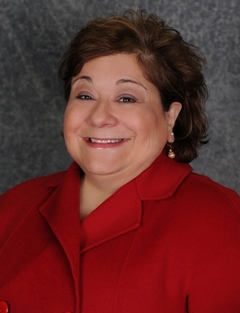 Many of you are working on your 2016 budgets, and I would suggest a few of the Public Affairs Council conferences be included to help with your government relations work.
Many of you are working on your 2016 budgets, and I would suggest a few of the Public Affairs Council conferences be included to help with your government relations work.
If you have some funds left for 2015, attend the State and Local Government Relations conference from September 23-25 at the Hilton Old Town in Alexandria, Virginia. This is the absolute best 101 program to learn about state and local government relations. We have used this as a stepping-stone to all first-year staff to learn more about the subject.
The premiere conferences offered by the Council are in 2016—National Grassroots Conference, January 25-28 in Orlando, and the National PAC Conference in Miami from March 7-10. Yes, it is winter, and yes, they are in Florida. However, set that aside and think about the sessions where discussions are held about:
- Case studies involving grassroots programs;
- Branding your grassroots program;
- Educating the members of your grassroots or PAC programs;
- Ethics, Gift Rules, and Legal Guidance (my favorite session);
- Engaging Senior Executives;
- Operating a Successful PAC;
- Communicating Across Generations;
- Hosting a Candidate Fundraiser;
- Auditing and Assessing Your PAC; and
- Setting a Course for Your Professional Development.
In the spirit of full disclosure, I serve on the PAC Board of Directors (but there are 160 of us, so no one really notices me) and I am on the Advisory Committee for both of the 2016 conferences…But, that should show my commitment to the Council and how much I treasure and value its contributions to the public affairs industry.
If you have any questions, please do not hesitate to give me a call. I would be happy to discuss the value and importance.
Until next month, remember professional development is something you should always push for to help you with your career.
Thank you.
President and CEO
State and Federal Communications, Inc. provides research and consulting services for government relations professionals on lobbying laws, procurement lobbying laws, political contribution laws in the United States and Canada. Learn more by visiting stateandfed.com.


